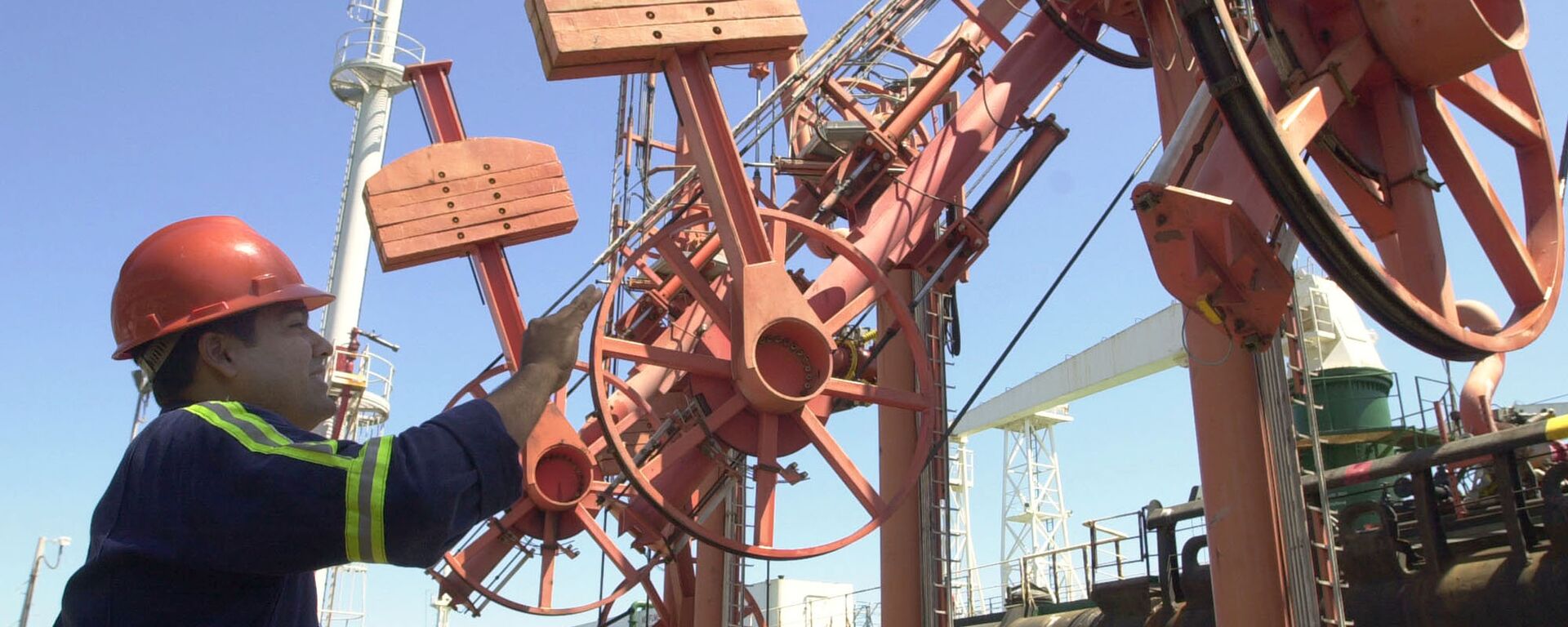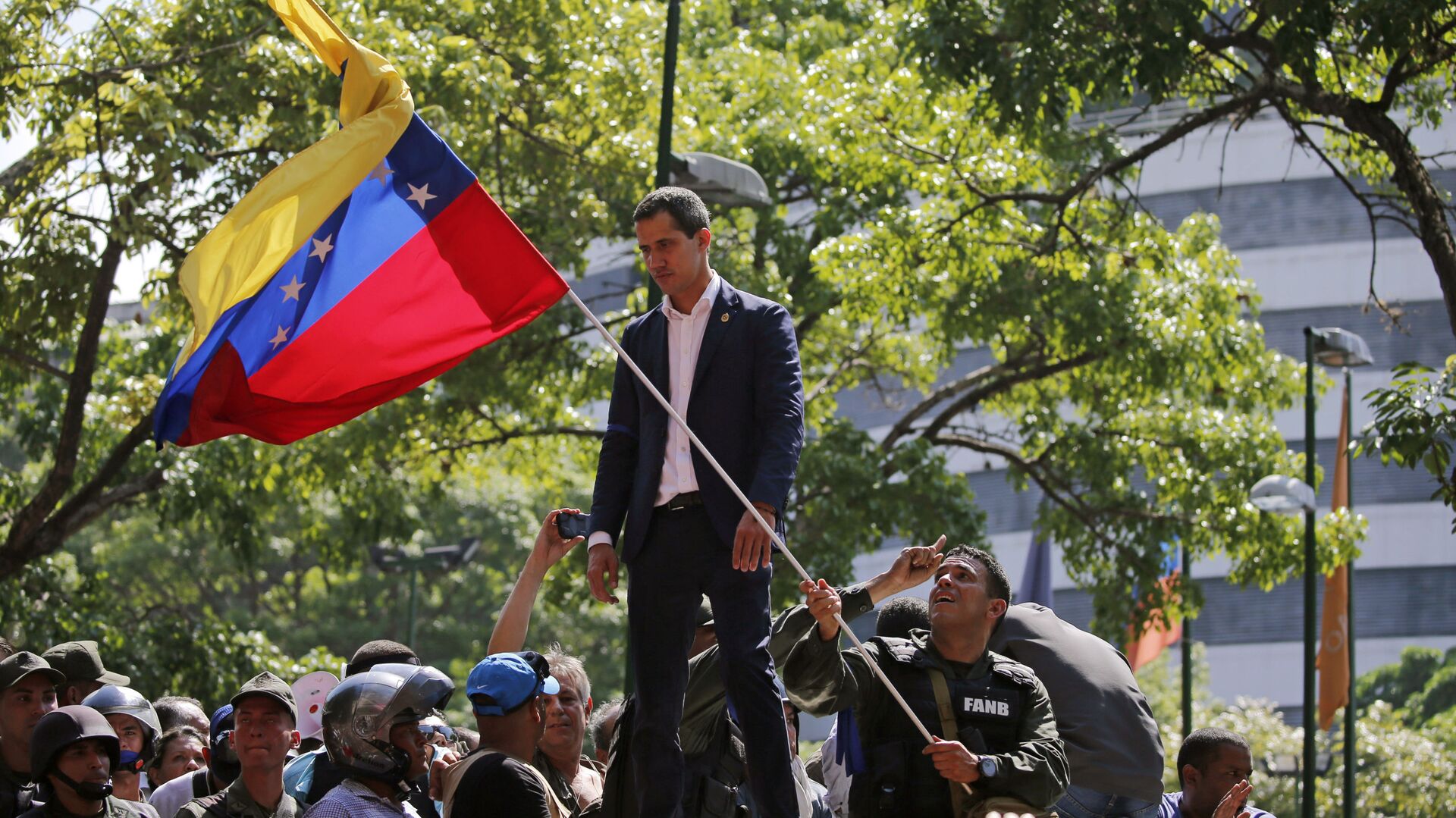https://sputnikglobe.com/20221025/venezuelas-opposition-dropping-guaids-government-in-2023-1102598818.html
Venezuela’s Opposition Dropping Guaidó’s ‘Government’ in 2023
Venezuela’s Opposition Dropping Guaidó’s ‘Government’ in 2023
Sputnik International
In 2019, the Trump administration imposed strict sanctions on Venezuelan oil and refused to acknowledge Nicolás Maduro as the legitimate President of... 25.10.2022, Sputnik International
2022-10-25T03:33+0000
2022-10-25T03:33+0000
2022-10-25T03:33+0000
americas
venezuela
juan guaidó
nicolás maduro
https://cdn1.img.sputnikglobe.com/img/107461/24/1074612425_0:161:3071:1888_1920x0_80_0_0_098af41041d9818cea9db689f6034bfd.jpg
According to a Reuters report that cites four sources, representatives of Venezuela's opposition party have told US State Department officials that they will no longer continue to support Guaidó’s parallel government in 2023, even if someone else is appointed as its leader. They instead want to nominate a candidate to face Maduro in an election tentatively set for late 2023 or early 2024.In 2018, the United States and other Western countries doubted the legitimacy of an election that saw Maduro reelected as the president of Venezuela. The Venezuelan constitution dictates that if a legitimate president is not elected, the National Assembly leader would become the interim president until an election can be held. That led Guaidó to set up an opposition government that was recognized by the United States. Many of Venezuela’s foreign assets held by the United States were given to the Guaidó government.However, Guaidó's absentee government has failed to remove Maduro from power. The socialist president still controls the Venezuelan military, domestic assets, intelligence communities, and land. Guaidó holds no authority politically or institutionally in Venezuela. The term of the National Assembly he was the head of ended in 2020, making the backing from some Western nations his only claim to power.Five of the six opposition-party members said they would not support Guaidó or the continuation of the alternative government. Only a representative from Guaidó’s Voluntad Popular party supported the continuation of the alternative government.If Guaidó’s government is absolved, it brings into question what happens to the foreign assets and companies supervised by the Venezuelan National Assembly. US courts recognized their legitimacy on the basis that Guaidó is the legitimate leader of Venezuela. If that justification dissolves, it may open them up to legal issues.Regardless, Guaidó’s support has been sinking quickly. Earlier this month at the Organization of American States (OAS) summit in Lima, 19 of the 35 member states voted to discuss removing Guaidó’s representation at the OAS. The motion fell short of the 24 votes needed to pass, but only four states supported Guaidó.The political climate has also changed in Latin America, with several countries moving towards leftist governments more in line with Maduro’s. The elections of Gustavo Petro in Colombia, Andrés Manuel López Obrador (aka AMLO) in Mexico, Gabriel Boric in Chile, and José Pedro Castillo in Peru have seen the region move further to the left in recent years. Luiz Inacio Lula da Silva may also defeat right-wing Brazilian President Jair Bolsonaro in a runoff election on October 30.The European Union has also withdrawn support of Guaidó after his National Assembly term ended in 2020, though they also do not recognize Maduro.Even the Biden administration, which officially still recognizes Guaidó, has shown more willingness to engage with the Maduro government. The administration has sent representatives to Caracas to discuss the easing of sanctions in exchange for elections. The move is largely seen as a way to get Venezuelan oil on the world market to combat the energy crisis and even included a phone call between Biden and Maduro. The two nations also exchanged prisoners in early October.
https://sputnikglobe.com/20221012/us-examining-possible-removal-of-sanctions-on-venezuela-oil-sector---reports-1101782501.html
americas
venezuela
Sputnik International
feedback@sputniknews.com
+74956456601
MIA „Rosiya Segodnya“
2022
News
en_EN
Sputnik International
feedback@sputniknews.com
+74956456601
MIA „Rosiya Segodnya“
Sputnik International
feedback@sputniknews.com
+74956456601
MIA „Rosiya Segodnya“
venezuela, juan guaidó, nicolás maduro
venezuela, juan guaidó, nicolás maduro
Venezuela’s Opposition Dropping Guaidó’s ‘Government’ in 2023
In 2019, the Trump administration imposed strict sanctions on Venezuelan oil and refused to acknowledge Nicolás Maduro as the legitimate President of Venezuela. Instead, the United States and dozens of Western countries recognized National Assembly leader Juan Guaidó as the “interim president.”
According to a
Reuters report that cites four sources, representatives of Venezuela's opposition party have told US State Department officials that they will no longer continue to support Guaidó’s parallel government in 2023, even if someone else is appointed as its leader. They instead want to nominate a candidate to face Maduro in an election tentatively set for late 2023 or early 2024.
In 2018, the United States and other Western countries doubted the legitimacy of an election that saw Maduro reelected as the president of Venezuela. The Venezuelan constitution dictates that if a legitimate president is not elected, the National Assembly leader would become the interim president until an election can be held. That led Guaidó to set up an opposition government that was recognized by the United States. Many of Venezuela’s foreign assets held by the United States were given to the Guaidó government.
However, Guaidó's absentee government has failed to remove Maduro from power. The socialist president still controls the Venezuelan military, domestic assets, intelligence communities, and land. Guaidó holds no authority politically or institutionally in Venezuela. The term of the National Assembly he was the head of ended in 2020, making the backing from some Western nations his only claim to power.

12 October 2022, 20:11 GMT
Five of the six opposition-party members said they would not support Guaidó or the continuation of the alternative government. Only a representative from Guaidó’s Voluntad Popular party supported the continuation of the alternative government.
If Guaidó’s government is absolved, it brings into question what happens to the foreign assets and companies supervised by the Venezuelan National Assembly. US courts recognized their legitimacy on the basis that Guaidó is the legitimate leader of Venezuela. If that justification dissolves, it may open them up to legal issues.
Regardless, Guaidó’s support has been sinking quickly. Earlier this month at the Organization of American States (OAS) summit in Lima, 19 of the 35 member states voted to discuss removing Guaidó’s representation at the OAS. The motion fell short of the 24 votes needed to pass, but only four states supported Guaidó.
The political climate has also changed in Latin America, with several countries moving towards leftist governments more in line with Maduro’s. The elections of Gustavo Petro in Colombia, Andrés Manuel López Obrador (aka AMLO) in Mexico, Gabriel Boric in Chile, and José Pedro Castillo in Peru have seen the region move further to the left in recent years. Luiz Inacio Lula da Silva may also defeat right-wing Brazilian President Jair Bolsonaro in a runoff election on October 30.
The European Union has also withdrawn support of Guaidó after his National Assembly term ended in 2020, though they also do not recognize Maduro.
Even the Biden administration, which officially still recognizes Guaidó, has shown more willingness to engage with the Maduro government. The administration has sent representatives to Caracas to discuss the easing of sanctions in exchange for elections. The move is largely seen as a way to get Venezuelan oil on the world market to combat the energy crisis and even included a phone call between Biden and Maduro. The two nations also exchanged prisoners in early October.





